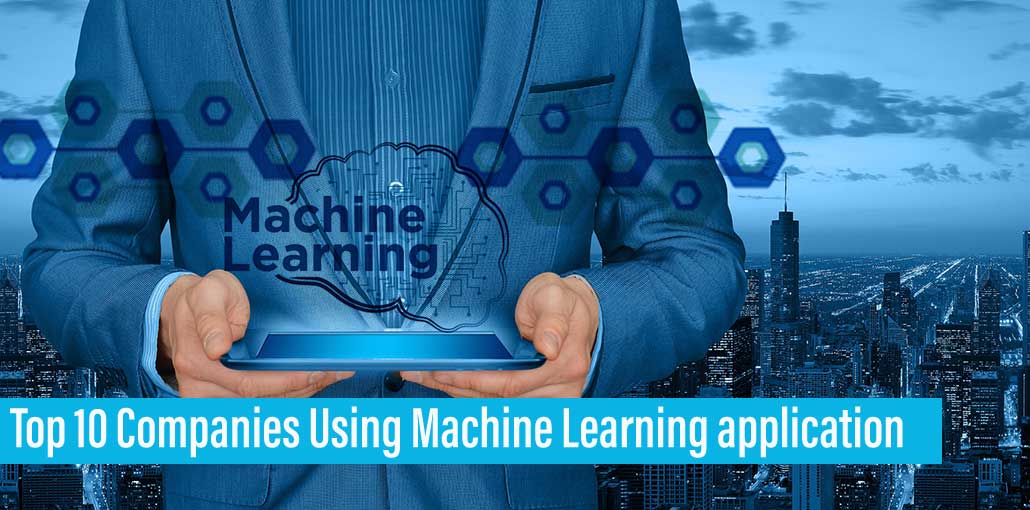Machine learning and artificial intelligence are two of the most important technological advances in recent times. Machine learning is a field that promises to disrupt (to borrow a favorite term) our lives as we know them. However, many of its applications are still unexplored.
See the example of machine learning in action! These are 10 companies using machine learning in exciting new ways. Plus, a glimpse into the future.
1. Google – Neural Networks & ‘Machines That Dream’
It’s easier these days to list areas in scientific R&D that Google (or, rather, parent company Alphabet- ) isn’t working upon, than to try to summarize Google’s technological ambitions.
Google has been busy over the years. They have expanded into fields such as medical devices and anti-aging technology. But perhaps the most exciting thing for tech geeks is the neural network.
The most prominent development in Google’s research into neural networks has been the DeepMind network or the “machine of dreams.” This network is the one that generated those psychedelic pictures everyone was talking about.
Google claims that the company is currently researching practically all aspects of machine learning. This will result in exciting developments in “classical algorithms” and other applications, such as speech translation, natural language processing, search ranking, and prediction systems.
2. Pinterest – Improved Content Discovery
Pinterest is a fascinating social media platform, regardless of whether you are a fervent pinner or a novice. Pinterest’s primary function being to curate content is why it’s important that you invest in technology that will make this process more efficient. This is certainly the case at Pinterest.
In 2015, Pinterest purchased Kosei a machine-learning company that specialized in the commercial application of machine learning tech (specifically content discovery and recommendation algorithms).
machine-learning is now used in almost every aspect of Pinterest’s business operations. It covers spam moderation, content discovery, advertising monetization, and reducing the churn for email newsletter subscribers. It’s pretty cool.
Also read: 10 Machine Learning Startups to Watch in 2022
3. Facebook – Chatbot Army
While Facebook Messenger is still somewhat contentious (people have very strong opinions about messaging apps), it’s an exciting aspect of the largest social media platform in the world. Messenger has been a kind of experimental laboratory for chatbots.
A chatbot can be created by any developer and submitted to Facebook Messenger. This allows companies that place a high emphasis on customer service or retention to use chatbots even if they are small startups with limited engineering resources.
Facebook is also interested in other applications of machine learning. Facebook uses AI to filter spam and low-quality content. The company is also looking into computer vision algorithms to “read” images for the visually impaired.
4. Twitter – Curated Timelines
Twitter has been the subject of many controversies lately (not least the controversial decisions to round out everyone’s avatars and change the way people are tagged via @ replies) but is the most contentious Twitter update. It’s moving towards an algorithmic feed.
You can have Twitter show you the “best tweets first” Or as a reasonable chronological timeline, These changes are being driven by Twitter’s machine-learning technology. Twitter’s AI evaluates every tweet in real-time and scores them using various metrics.
Twitter’s algorithms determine which tweets are most likely to get the most engagement. This is done on an individual basis. Twitter’s machine-learning tech makes these decisions based on your individual preferences. The result is the algorithmically curated feeds. (Does anyone actually prefer the algorithmic feed?) You lovely, weirdos, tell me why in comments.
5. Yelp – Image Curation at Scale
There are few things that compare to the experience of trying out a new restaurant and then posting negative reviews online. Yelp’s popularity and utility are just a few of the many reasons it is so useful.
Although Yelp may not appear to be a tech company, Yelp uses machine learning to enhance users’ experiences.
Yelp images are just as important as user reviews, so it is not surprising that Yelp constantly strives to improve its image processing.
This is why Yelp embraced machine learning when it implemented its picture classification technology a few years back. Yelp’s machine-learning algorithms allow the company’s staff to more efficiently compile, categorize and label images. This is a huge feat considering that they have millions of photos.
6. Edgecase – Enhancing Ecommerce Conversion Rates
Retailers have struggled for years to overcome the huge disconnect between online and in-store shopping. Many eCommerce websites still fall for the trap of traditional retail, despite all the hype about how online shopping will end. Edgecase, previously known as Compare Metrics hoped to change that.
Edgecase hopes that its machine learning technology will help eCommerce merchants improve their user experience. Edgecase will streamline the eCommerce experience to increase conversion rates. Edgecase also plans to leverage its tech to offer a better shopping experience to shoppers who have no idea what they are looking for. by analyzing certain behaviors and actions that indicate commercial intent. This is an attempt to make online casual browsing more enjoyable and closer to traditional retail experiences.
7. Salesforce – Intelligent CRMs
Salesforce is the tech giant. It has a strong market share in customer relationship management (CRM), and the resources to match. Scoring and lead prediction are two of the most difficult challenges for any digital marketer. Salesforce has invested heavily in its Einstein machine-learning technology.
Salesforce Einstein allows companies that use Salesforce’s CRM software, to analyze every aspect of a customer’s relationship. This includes initial contact and ongoing engagement touchpoints. It also allows them to create more detailed profiles of customers to identify key moments in the sales process. This allows for more lead scoring, better customer service (and happier customers), as well as more opportunities.
8. Baidu – The Future of Voice Search
Google isn’t the only search engine that’s expanding into machine learning. Baidu, a Chinese search engine, is also heavily investing in AI applications.
The most intriguing (and disturbing) development at Baidu’s R&D laboratory is Deep Voice, which Baidu calls Deep voice. This deep neural network can create completely synthetic human voices that are difficult to distinguish from real human speech. It can learn the subtleties of speech, pitch, pronunciation, and cadence to produce eerily accurate reproductions of speakers’ voices.
Deep Voice 2, the latest version of the Deep Voice technology, is far from an insignificant experiment. It promises to have a lasting effect on natural language processing. This technology is the basis for voice searching and voice pattern detection systems. This could have significant implications for voice search applications as well as dozens of other potential uses such as biometric security and real-time translation.
Also read: Top 10 Machine Learning Applications in Real World
9. HubSpot – Smarter Sales
HubSpot is a well-known company. It has been an early adopter and evangelist of new technologies for a long time. This was demonstrated once again by HubSpot’s announcement of the acquisition of Kemvi, a machine learning company.
HubSpot intends to use Kemvi’s technology in a variety of applications, including integrating Kemvi’s DeepGraph machine-learning and natural language processing tech into its internal content management system.
This according to HubSpot’s Chief Strategist Officer Bradford Coffey will enable HubSpot better identify “triggers” which are changes in a company’s management or structure that can affect day-to-day operations. It will also allow HubSpot to more effectively pitch potential clients and service existing customers.
10. IBM – Better Healthcare
Although it might seem strange to include IBM, as IBM is the oldest and largest legacy technology company, IBM has done a remarkable job of transitioning from older business models to more lucrative revenue streams. This is demonstrated by IBM’s renowned AI, Watson.
Watson is a Jeopardy champion but has a much better track record than beating human contestants on televised games shows. Watson was deployed in many hospitals and medical centers in recent years, where it has proven its ability to make highly accurate recommendations regarding the treatment of certain cancer types.
Watson has significant potential in both the retail and hospitality sectors. It could also be used to assist shoppers. IBM now offers its Watson machine-learning technology under a license agreement – the first example of an AI application packaged in this way.
Future of Machine Learning
Rapid technological progress can lead to one of the biggest problems: we take these leaps as a given. Machine learning has many applications that were unimaginable a decade ago. Yet, scientists and researchers continue to make incredible progress at an amazing pace.










Leave a comment